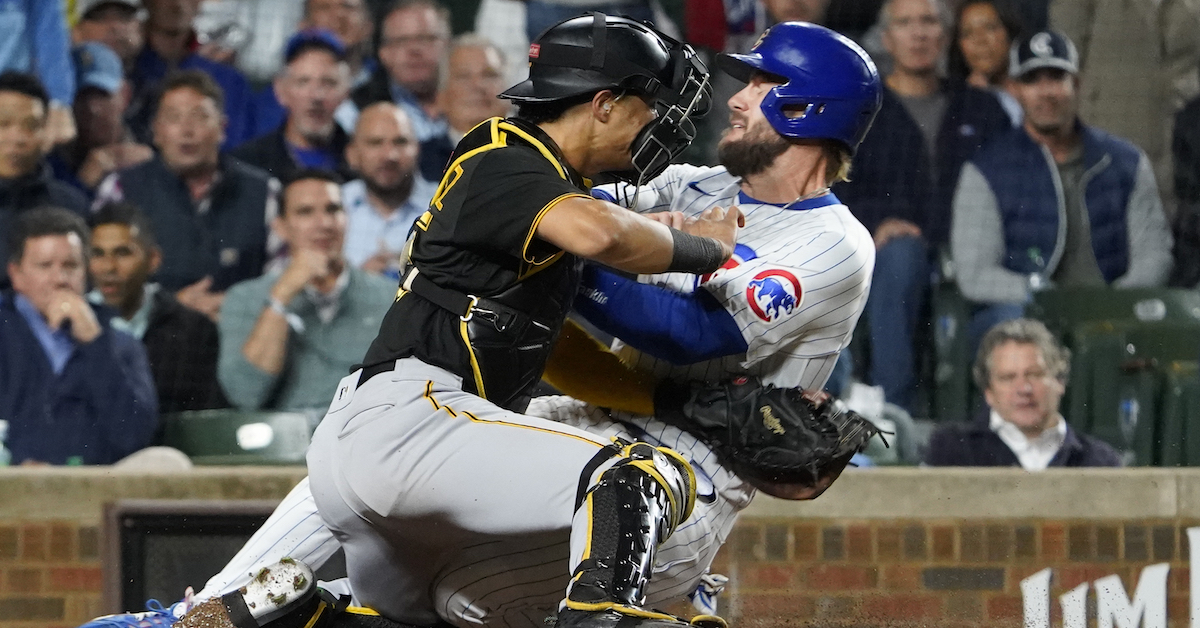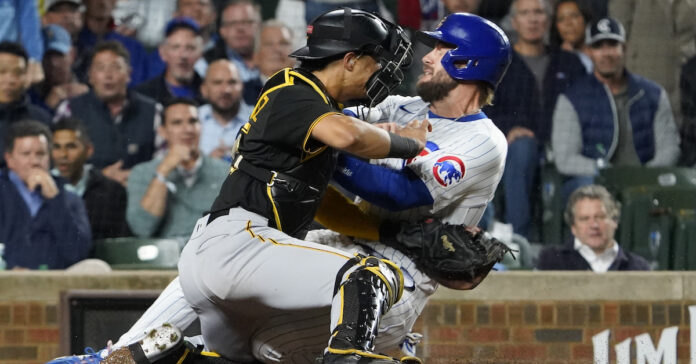
It’s starting. The playoffs are coming, and the baseball is getting more intense. Bats will flip. Tempers will flare. Players will curse even more than they do already. That’s great. Everybody loves playoff baseball. But that also makes this a good time to appreciate baseball’s tender side. I would like to draw your attention to two plays that happened on Tuesday. Both were plays at the plate, and in both, the catcher and the baserunner crashed into each other. And then, in both, immediately after crashing into each other, the catcher and the runner checked to make sure that the other was ok. Our topic for the day is not sensual baseball, but rather sensitive baseball.
It’s not just that I love these moments, it’s that they fulfill a need. When two players collide, there is something in me that sees it as an opportunity for kindness. I find myself hoping that they’ll check in on each other, that they’ll let their humanity shine through the adrenaline and desire and competitiveness. And when the two players do in fact take the time to check on each other, it makes me feel good. In the middle of the game, I am willing more kindness into the world. I’m not sure why. That’s certainly not the main reason I care about baseball, but it’s there.
The first play happened at Wrigley Field. In the bottom of the second, Nico Hoerner hit a sacrifice fly to catcher-turned-right fielder Henry Davis. Davis made a strong throw, but the 100 mph heave short hopped Endy Rodríguez and brought him up the line, putting him in position to be blown up by Patrick Wisdom.
Wisdom saw Rodríguez coming at him and raised his arms in order to avoid taking a shoulder directly to the face, but the result was that instead of taking a blow, he delivered one. He absolutely wrecked Rodríguez. The play could’ve resulted in a serious injury. Had Rodríguez’s left foot been planted a bit more firmly, he wouldn’t have been able to absorb the impact by sliding backward. Wisdom seemed all too aware of this, and immediately asked Rodríguez if he was alright. He had just scored a big run in an exciting fashion, and there was a big smile waiting to take over his face, but it didn’t do so until he knew the answer to his question.
It would certainly have been understandable for Rodríguez to betray anger. Instead, he responded with grace. My favorite moment comes after Rodríguez exhales deeply in order to collect himself. He glances down and realizes that he’s supporting himself by leaning on his right hand, which is located on Wisdom’s right upper thigh. He still needs the support, but now that the excitement is over, it seems like too much of an incursion into Wisdom’s personal space, so he relocates his hand to the left thigh. There are degrees of intimacy, and supporting yourself on someone’s nearer thigh is a couple ticks below reaching across their body to support yourself on their far thigh.
The second play was a walk-off at Dodger Stadium. With two on and the score tied in the bottom of the ninth, Max Muncy hit a rocket to Kerry Carpenter in right field. Even with two outs and the game on the line, most runners don’t score from second on 109.7 mph liners that are hit more or less right at the right fielder, but then most runners aren’t Mookie Betts. The throw took Jake Rogers a few steps up the first base line, so he and Betts were diving toward the plate at the exact same moment. In fact, as soon as his mitten touched the plate, you could see Betts try to roll away from Rogers, who entered the collision with the advantage of three inches, 23 pounds, and a bunch of body armor.
Betts wasn’t quite successful. With Rogers wearing a helmet and facemask, the two players knocked heads hard, then immediately embraced each other. Betts, fully supine, pounded Rogers on the back, and Rogers patted Betts on the sternum. This play was the entire game, and the first instinct of both players was to make sure that the other hadn’t been hurt.
But that’s not even my favorite moment. Betts was only in scoring position because Will Smith pushed him to second by taking a 97.5 mph fastball to the triceps. As the Dodgers swarmed Muncy to celebrate, Alex Vesia found Smith in the middle of the scrum, shouted, “Hey, are you ok?” and rubbed his arm.
I suspect that part of the reason I care so much about plays like this one is that I have injured myself playing sports kind of a lot. I have torn just about everything there is to tear in a knee, and when it looks like a player might be hurt, I really do worry about them. Obviously, you don’t need to tear an ACL to hope that other people don’t get injured, but it does make the danger feel more present, more pressing.
I also think that checking on someone is an underappreciated form of kindness. So much of life’s dissatisfaction is caused by feeling like you don’t really matter to the people around you. That is easy to prevent. People feel seen when you know that it’s their birthday, when you notice their new haircut, when you remember to actually pay them the compliment that you’d been meaning to pay them. It’s the easiest thing in the world to ask someone how they’re doing, and it’s the easiest thing in the world to care about the answer. I can be pretty awkward around others (or alone, for that matter), and I suspect that I learned some of these lessons later than most people. Emerson wrote, “We have a great deal more kindness than is ever spoken.” As someone who has had to work on speaking more of my kindness, I tend to cheer for others to speak theirs.
Lastly, I think that it’s every bit as reasonable to root for your favorite players to be kind and considerate as it is to root for them to play well.
It’s September 21, and I am excited for the playoffs. I am excited to see who wins a Wild Card spot and who comes out on top in the AL West. I also feel just a little bit better about baseball than I did a few days ago.

